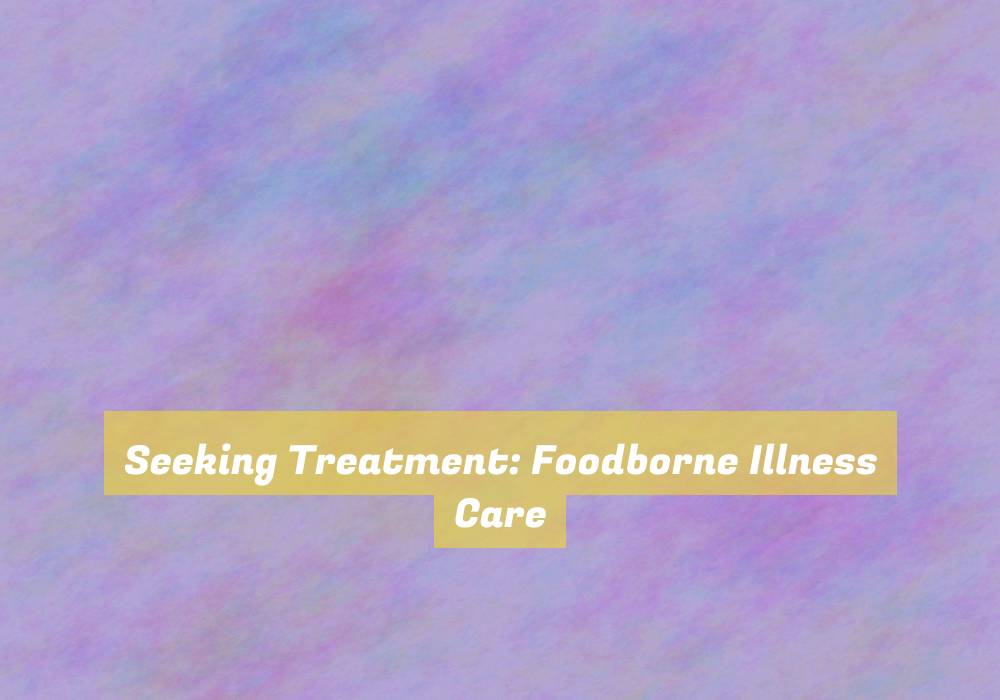Seeking Treatment: Foodborne Illness Care
YouG??re feeling a bit queasy after that meal you had, and you canG??t shake off the discomfort. You may be experiencing symptoms of a foodborne illness, and itG??s important to know when itG??s time to seek medical attention.
Understanding the steps to take when faced with a potential foodborne illness can make a significant difference in your recovery and overall well-being. From recognizing the signs to the various treatment options available, being informed about foodborne illness care is crucial for your health.
Recognizing Symptoms of Foodborne Illness
Recognize the symptoms of foodborne illness by paying attention to signs such as nausea, vomiting, diarrhea, and abdominal pain. These symptoms can appear anywhere from a few hours to several days after consuming contaminated food or beverages. You may also experience fever, chills, muscle aches, and fatigue. ItG??s crucial to be mindful of these signs, as foodborne illnesses can range from mild discomfort to severe health complications. If you notice these symptoms in yourself or others, itG??s important to seek medical attention promptly.
In addition to the common symptoms, certain foodborne pathogens can cause specific effects. For example, E. coli can lead to bloody diarrhea, while botulism may result in blurred vision, difficulty swallowing, and muscle weakness. Understanding these distinct symptoms can help in identifying the specific type of foodborne illness and receiving appropriate treatment.
ItG??s essential to remember that the onset and severity of symptoms can vary based on factors such as the individualG??s immune system and the type of pathogen involved. Being vigilant about recognizing these symptoms can lead to timely intervention and better outcomes.
Seeking Medical Attention
If you or someone you know experiences any of the symptoms mentioned earlier, itG??s imperative to promptly seek medical attention. When dealing with a potential foodborne illness, itG??s crucial to consult a healthcare professional as soon as symptoms arise. The severity of foodborne illnesses can vary, and some may require immediate medical intervention. DonG??t hesitate to contact your healthcare provider or visit an urgent care facility if you experience severe symptoms such as persistent vomiting, high fever, dehydration, or bloody diarrhea.
Upon seeking medical attention, be prepared to provide detailed information about the foods youG??ve consumed recently, as well as the onset and progression of your symptoms. This will assist the healthcare provider in making an accurate diagnosis and determining the appropriate course of treatment. Depending on the severity of the illness, you may need to undergo diagnostic tests, receive intravenous fluids for dehydration, or be prescribed medication to alleviate symptoms and combat the underlying infection.
Treatment Options for Foodborne Illness
To effectively combat a foodborne illness, medical professionals may recommend various treatment options tailored to address specific symptoms and the underlying cause of the illness.
If youG??re experiencing dehydration due to vomiting or diarrhea, rehydration is crucial. This can be achieved through oral rehydration solutions or, in severe cases, intravenous fluids administered by healthcare providers.
Anti-diarrheal medications may be prescribed to manage diarrhea symptoms, but itG??s essential to consult a healthcare professional before taking these medications, especially for children.
For cases involving bacterial infections, antibiotics may be prescribed based on the specific bacteria causing the illness. ItG??s important to complete the full course of antibiotics as prescribed by the healthcare provider.
In instances of foodborne illness caused by parasites or viruses, treatment focuses on alleviating symptoms and allowing the body to naturally eliminate the infection.
For severe cases or when complications arise, hospitalization may be necessary for more intensive care and monitoring.
ItG??s crucial to seek medical attention promptly to receive an accurate diagnosis and appropriate treatment for foodborne illness.
Preventing Future Foodborne Illness
Looking ahead, taking proactive measures to prevent future foodborne illness is essential for safeguarding your health and well-being. Start by practicing proper food safety habits at home. Always wash your hands before handling food, and ensure that all fruits and vegetables are thoroughly washed. Separate raw meats from other foods to prevent cross-contamination, and use separate cutting boards and utensils for raw meats and produce. Cook foods to their recommended internal temperatures, and refrigerate leftovers promptly.
When dining out, choose restaurants that have a reputation for food safety and cleanliness. Look for establishments that have high ratings for hygiene and sanitation. When ordering, especially with foods like seafood and undercooked meats, make sure theyG??re prepared and cooked thoroughly. Be cautious of buffet-style restaurants, as they can pose a higher risk of food contamination.
ItG??s also important to stay informed about food recalls and warnings. Keep an eye on food recalls and stay updated on any potential risks associated with certain food products. By staying vigilant and taking these proactive measures, you can significantly reduce the risk of experiencing foodborne illness in the future.
Conclusion
So remember, if you ever suspect that you have a foodborne illness, seek medical attention right away. Recognize the symptoms and donG??t hesitate to get the care you need.
There are treatment options available, and itG??s important to take steps to prevent future foodborne illness. Your health is important, so donG??t ignore any signs of illness and make sure to take care of yourself.
